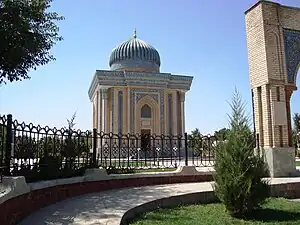| Part of a series on Sunni Islam |
|---|
|
In terms of Ihsan: |
|
|
| Part of a series on Islam Sufism |
|---|
 Tomb of Abdul Qadir Gilani, Baghdad, Iraq |
|
List of sufis |
|
Topics in Sufism |
|
|
Aziz Mahmud Hudayi (1541–1628), (b. Şereflikoçhisar, d. Üsküdar), is amongst the most famous Sufi Muslim saints of the Ottoman Empire. A mystic, poet, composer, author, statesman and Hanafi Maturidi Islamic scholar,[1] he was the third and last husband of Ayşe Hümaşah Sultan, granddaughter of Sultan Suleiman the Magnificent.
Life
Born of Hashemite ancestry[2] in Şereflikoçhisar in Central Anatolia, Aziz Mahmud Hudayi completed his studies in a medrese in Istanbul. He became the Sheikh of Sultan Ahmed I who constructed the famous Blue Mosque and so read the first Friday prayer there on its opening. He was also especially respected by Sultan Murad III. He is a descendant of Junayd of Baghdad, and, as a descendant of Husayn ibn 'Ali, can be called a sayyid.
He founded the Jelveti (Turkish: Celveti) order of sufis and served as a qadi (Islamic judge, kadi in Turkish) in Edirne, Egypt, Sham (Syria), and Bursa. A murid (disciple) and khalifah (successor) of Üftade Hazretleri of Bursa, he wrote about thirty works, seven of them in Turkish. Mustafa Gaibi, a prominent sufi from Ottoman Bosnia, was one of his disciples.
His supplication prompted many sailors of the Ottoman Navy to visit his grave before going out to sea:
Those who visit us when we are alive, and those who visit our grave after our death and read the Fatiha when passing by our tomb are ours. May those who love us not drown at sea, may they not suffer poverty in their old age, and may they not pass away without saving their faith.[3]
He died in Üsküdar, Istanbul and was buried on a site which is now enclosed within a mosque complex that remains a site of pilgrimage and devotion.[4] By 1855 it was in ruins but was restored and expanded by Sultan Abdülmecid I.[4]
The small stone house in which he lived is a few miles away from the complex. The 19th-century Üsküdar-born artist Hoca Ali Riza painted a watercolour of the house standing alone in what was then countryside. A foundation named after him now maintains the house which has become the Çilehane Mescid overlooked by the large new Çilehane Cami. [5]
Four Patron Saints of the Bosphorus
Along with Yahya Efendi, Telli Baba, and Yuşa (Joshua), Aziz Mahmud Hudayi is considered to be one of the Four Patron Saints of the Bosphorus.
See also
- Mustafa Devati, a successor
References
- ↑ "Aziz Mahmud Hudayi (1543–1628) (ra) – Uskudur, Istanbul". Archived from the original on 2015-07-09. Retrieved 2015-07-08.
- ↑ "AZÎZ MAHMÛD HÜDÂYİ HAZRETLERİ'NİN HAYATI | Hüdayi Vakfı".
- ↑ "Life of Aziz Mahmud Hüdayi | Hudayi Foundation" (in Turkish). Retrieved 2020-11-17.
- 1 2 "AZİZ MAHMUD HÜDÂYÎ KÜLLİYESİ". TDV İslâm Ansiklopedisi (in Turkish). Retrieved 2023-07-18.
- ↑ "Aziz Mahmud Hüdayi Vakfı" (in Turkish). 2016-10-03. Retrieved 2022-06-10.
| |||||||||||||||||||
| |||||||||||||||||||
Muslim scholars of the Hanafi school | |||||
|---|---|---|---|---|---|
| 2nd/8th |
| ||||
| 3rd/9th |
| ||||
| 4th/10th |
| ||||
| 5th/11th |
| ||||
| 6th/12th |
| ||||
| 7th/13th |
| ||||
| 8th/14th |
| ||||
| 9th/15th |
| ||||
| 10th/16th |
| ||||
| 11th/17th |
| ||||
| 12th/18th |
| ||||
| 13th/19th |
| ||||
| 14th/20th |
| ||||
| 15th/21st |
| ||||
| Living |
| ||||
Scholars of other Sunni Islamic schools of jurisprudence
| |||||
| Maturidi scholars |
|  | ||||||||||||||||||||||||
|---|---|---|---|---|---|---|---|---|---|---|---|---|---|---|---|---|---|---|---|---|---|---|---|---|---|---|
| Theology books | ||||||||||||||||||||||||||
| See also | ||||||||||||||||||||||||||
Maturidi-related templates
| ||||||||||||||||||||||||||